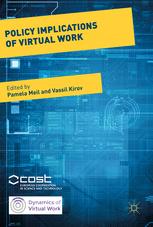

Most ebook files are in PDF format, so you can easily read them using various software such as Foxit Reader or directly on the Google Chrome browser.
Some ebook files are released by publishers in other formats such as .awz, .mobi, .epub, .fb2, etc. You may need to install specific software to read these formats on mobile/PC, such as Calibre.
Please read the tutorial at this link: https://ebookbell.com/faq
We offer FREE conversion to the popular formats you request; however, this may take some time. Therefore, right after payment, please email us, and we will try to provide the service as quickly as possible.
For some exceptional file formats or broken links (if any), please refrain from opening any disputes. Instead, email us first, and we will try to assist within a maximum of 6 hours.
EbookBell Team

5.0
28 reviewsThis collection presents an array of policy debates and implications emerging from virtual work. The authors cover a range of areas, including: conceptual debates, measuring virtual work; discourses and levels of policy intervention; the role of the sharing and collaborative economy; and resultant challenges for organized labour, law and regulation.
The authors of the chapters analyse the ways in which processes of digitalization leading to virtual work impact so many aspects of our lives: the way we buy, sell, network, communicate, participate, create, consume, and, of course, the way we work. In turn they focus on the subsequent implications for the future of work as well as the viability of existing social protection systems.
The developments examined here are salient for both policy stakeholders and for the academic community in areas such as labour sociology, industrial relations, gender studies, political economy, and economic geography.